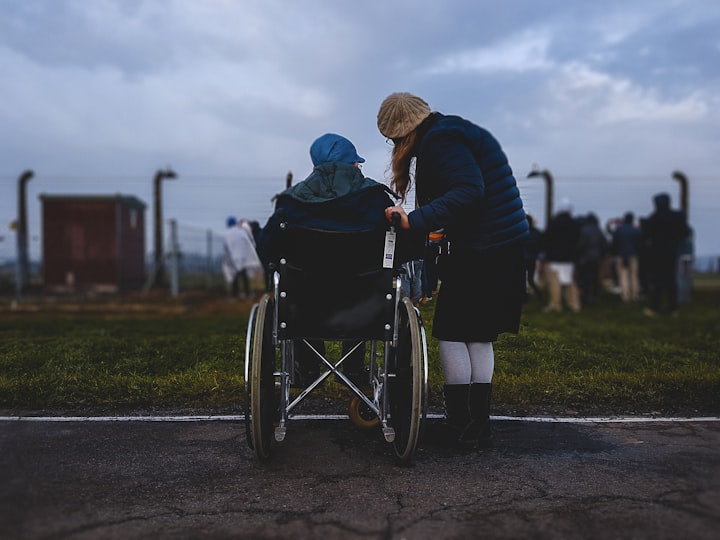Access isn't just about buildings
How society can be part of the problem

The issue of Access is often a contentious one, if you talk to someone with a disability then there is always problems with not enough being done, yet if you talk to people in authority there are always excuses as to why more can not be done. I appreciate that there are times when it is not possible for there to be access to something be it the physical limitations of the person themselves (e.g. rock climbing) or through buildings being so old that they can't be adjusted enough to be fully accessible.
Although this is the case, organisations will often hide behind 'reasonable adjustment', expecting disabled people to just accept that as much is being done as possible. As mentioned above, I appreciate there are some limitations with buildings that are really old and that I will not be able to get everywhere that I may want to, but I still feel that often more can be done than is currently being done so. Companies should want to do as much as they can to include everyone (at the end of the day my money is as good as the next persons) Why do companies wait till they're forced to make changes? For example new trains are designed to be just like the old ones, but the old ones aren't practical, to make transport links more accessible changes need to be made, so why not start making those changes to the new trains that are being produced. Small steps but a big difference to someone in a wheelchair in the long term (that would mean one more train that I could get on without having to ask for help).
Attitudes to disability can be as limiting to access as much as the physical limitations of access. Previously when I went to France for a holiday and before I even got to France I was feeling positive about the experience. I got to the Eurostar terminal at St Pancras and instantly there was a higher level of service than I regularly experience in the UK. An example of this was getting to a lift which was manned, I was given priority for the lift rather than having to wait for all the passengers who couldn't be bothered to use the travelator (which is something that seems to be a sad but regular experience for me). I understand that there are people with hidden disabilities who can't walk far etc, but the amount of people that I regularly see waiting at lifts tells me that they haven't all got disabilities and are abusing something that is there to help people with limited mobility.
On one occasion when I went to a concert, people had crammed a lift to literally breaking point. The lift cut out and my husband had to climb up a flight of stairs to find someone to sort it out. On this occasion it was going to be unlikely that I was going to be on my own, but I may have been with a number of people unable to climb the stairs, then what would I have done? I know that there are occasions where a disabled person is taking advantage of what they think they should have, but this is in the minority. Unfortunately, the media ensures that the wider population is made aware of these individuals abusing the system and so assume that everyone who is disabled is the same. This is just not true, disabled people need understanding and support and attitudes to change before they are able to really feel part of society. Only then will access not be seen as a problem.
At times I see wonderful attitudes as mentioned above the journey to France started well and it continued in the same vein. I got to the platform for the Eurostar Train and before I was anywhere near the carriage I was being asked what assistance I needed and they were onto it immediately. When I arrived in Lille I was a little nervous, as my experience of UK special assistance is patchy, to say the least, BUT I was pleasantly surprised. There was someone there straight away who ensured that we were okay. We had some time in Lille so we went off before finding out what was needed for special assistance, but again we were pleased with what we saw. Someone was coming out to meet us before we were even going into the office, they helped us on to the train, and we were amazed at what we were greeted with on the train (it was obviously one of the newest because as we found out later they are not all as good) I had a choice of sitting in my wheelchair or sitting in a normal seat, this seat wasn't just a plain static seat that we get in the UK no, it swivelled round to make it easier for me to get on and reclined like all the other seats in carriage did also. I was amazed at the level of detail that had gone into this train but it wasn't just that, it was the attitude towards me as a customer like anyone else.
While in France we went to a theme park called Futuroscope, it is a theme park that is modelled on the future, using amazing technology for all the attractions. There was a number of attractions I could do without any problem at all, often missing out on lots of queuing etc because the only accessible entrance was different to everyone else (which I am definitely not complaining about!). There was a small number which I was unsure of the suitability, and so members of staff were asked. They were always really friendly and would let me look and decide for myself whether I felt they were suitable rather than being told they weren't. It was nice to have that control because I am able to make my own decisions and although I would love to do everything I know that there are times when it's just not possible and I accept that.
What I do not feel I should accept anymore is the restrictions that society places on me that prevents me from aspiring to have a better life. I was born with a disability called Spina Bifida which meansI am now a full-time wheelchair user, and have had to learn to grow up in a mainstream world, this has not always been easy as there have been a number of times when I have perhaps not had the same access to opportunities as my peers have. When at school I was always keen on sport and my teachers always did their best to get me involved, unfortunately looking back I am able to see fault in their attempts as the outcome always led to feeling like I had to make do as they had done the best that they can.
When trying to get involved in sport outside of school this was an even bigger challenge. I would be pushed from pillar to post being told to speak with this person or that person. Rather than being embraced as a positive move towards inclusion, I was always made to feel a problem where this and many other things in my life are concerned. I have been involved in a number of different disabled sports camps as a child but when I wanted something more regular it just wasn't there. I was an enthusiastic young person who was seeing role models like Tanni Grey Thompson succeed at what I aspired to be, this enthusiasm was sadly not embraced and I learnt very early on that what you wanted and what you got were often two completely different things.
As a result of this negative experience, I gave up feeling like I was ever going to be involved in sport and learnt following my dreams was a waste of time. I finished school and had no direction in my life as up to now all my dreams and aspirations were mistreated so what was the point of aspiring to be anything?
Thankfully things are changing for disabled children and there are more opportunities for them to get involved if they so wish. For me though in some aspects it is slightly too late for me to achieve some of what I dreamed of. This does not stop me from aspiring for more, but should I or should I just accept what I have, moving on from the past?
Some of the most positive experiences with the sport came as an adult, initially when I decided that I wanted to have a go at tennis, so I contacted a local tennis centre and was happy to see the response provided. They admitted that they had no one in a wheelchair at the centre, but that they were happy to learn and give it a try. It is that 'can do' attitude towards something that can make all the difference and it definitely did on this occasion. I regularly attended lessons for a while as well as went to a couple of tennis camps which I really enjoyed. Unfortunately, this never led to what I hoped it would and so I started to become a little disheartened by this experience. At least I was getting some exercise though and I enjoyed it while it lasted.
Wheelchair Basketball is an area that I can definitely say I have experienced both ends of the scale in terms of positive and negative experiences. As a child, I tried to get into Wheelchair Basketball and so found out about a session locally. I attended these sessions for a number of years but found myself losing interest as I was never encouraged and could not see the point of pursuing something that had no future. The sessions were very much an excuse for some players who were in teams to have a mess about and no attention was given to new players who might want to learn how to play and improve.
I am pleased to say that as an adult I have been given the opportunity to get involved in Wheelchair Basketball again. This time being shown what a proper training session was meant to involve and being given hope that I have the potential to become a better player and get involved with a team of some amazing people. This opportunity came due to attending a one off event on in my local town and has led to me attending regular training sessions in Northampton and becoming part of a third division team. It does still mean that there is not anything locally as I would like but I am so glad that I attended this event as it has given me opportunities that I never dreamt possible. It has let me dream and aspire for more and given me a purpose that I was beginning to feel like I was lacking.
Disability sport doesn't always have a positive outcome like this as mentioned above as a child it was very difficult to join in, but things are improving slowly. Unfortunately, I feel they are improving slower than they should, for example, if you live in Holland and are in a wheelchair you are encouraged to try a sport, so much so that they will provide you with a wheelchair on a trial period.
Time, money and energy are needed for the improvements to be made, but it is needed. Disability Sport is getting big all over the world, with sportsmen and women becoming role models and recognised as much as their able bodied counterparts but in this country, you are lucky if five minutes of disability sport is shown in a programme that is 2-3 hours long. I understand that they are seen as minority sports, but my argument for that is how our attitudes going to change if this view isn't challenged. The media has the power to raise the profile of disability sport, yet they don't/won't. As long as the media does enough they don't care about the bigger picture.
Looking at the bigger picture is also a contentious issue, recently as part of the development of Wheelchair Basketball in the area, my coach and I were put in contact with a representative from the local sports development team to discuss opportunities that were arising. As a result of this, I was given the opportunity to go on a level 1 Wheelchair Basketball Coaching course in the first step towards me being able to support a club if there was the opportunity for one locally. Everyone has been very keen for this to happen and it has been a refreshing change from the experiences as a child to see that this was being taken seriously. On a side issue, my coach found out about an opportunity to coach some sessions at the local university which was all sounding very positive. Unfortunately, things have changed very quickly and it has shown that there is very little understanding of disability and the issues disabled people face on a daily basis.
When we raised a couple of concerns about the facilities and other questions we had about future plans it became evident that they had put little thought into our concerns and did very little to reassure me that they were keen to prevent these issues from stopping this opportunity for myself from going ahead.
Thiat experience backs up previous feelings about disability sport not being important and that provision for disabled people often becomes about ticking a box rather than wanting to have a truly positive impact on disabled peoples lives. If our concerns were taken seriously they would have taken the time to realise why we were saying what we were and was not just to be awkward but because they are genuine issues that disabled people face on a daily basis. If the time was taken why would they purposely go about making a disabled person life more challenging?
One of the issues raised was that of the flooring used in the sports hall. The sports hall is very new and has had to adhere to certain guidelines including automatic wide doors, disabled toilets and wide corridors. Unfortunately, that is the last point in which the architects have thought about the suitability for disabled people. The flooring used is unsuitable for a fast game of Wheelchair Basketball because to push on it you have to push twice as hard to get the same distance as a standard surface. We raised this issue as well as others, which we were told 'to get on with it'. If a disabled person 'just gets on with it' on this surface it could have lasting psychological and physical effects on the individual so I do not see why we were wrong to raise this issue so that we could work together to problem solve. The thought gone into the sports hall is very much along the lines of its alright as a disabled person can come in and watch others play. Why would they want to join in with their peers anyway? It's okay they can watch in the segregated seating as they can't get up to the raised seating that has been put in for everyone else.
For attitudes and access to improve people need to work together to make it happen, I know it won't happen overnight but we need to keep trying as a society. Disabled people are one of the most vulnerable groups of people in society and should be being helped not pushed deeper into poverty and segregation which can only lead towards second class citizens. Over recent years the welfare reforms have been just another way for the government to cut money and this has meant that a great number of disabled people dont have enough money to survive, particularly as many disabled people have increased cost as a result of their disability, the increased cost is rarely predictable and so how can the government propose changes which are based on predictable care needs?
The cost of living with a disability isn't just about the number of benefits that can be received. Many people with disabilities would like to do some kind of work, but for a number of reasons are unable to do so. These reasons may be for health reasons but they may also be for societal reasons, as it is often much harder for a disabled person to get a job than it is for an able bodied person because the employer will see the disability first and will ignore the 'ability' of that person. This means disabled people are often more reliant on help from the state because whether they want to or not they can't get the work to be able to support themselves. This then becomes a vicious circle where a person with a disability cannot go out and spend money. Many activities that disabled people participate in are also more expensive especially when thinking about sport, it is not just a case of buying some trainers, specialist equipment like sports wheelchairs costs money.
Even disabled people who are in work, often don't get a good deal, finding work that they are overqualified and underpaid for with very little career progression. Just because I am a wheelchair user doesn't mean that I don't have aspirations for more than I have got. In the meantime, we have to continue as we are, with the hope that someone can see past my wheelchair and give me the opportunity for better employment prospects so that I feel able to aspire to be more than I am and have more than I currently do. Although most couples have one person who earns more than the other, I feel that I am being unfairly constricted by my wheelchair. Is it really that wrong to want to be an equal partner financially.
If anything Covid 19 has helped disabled people to find work as it is no longer frowned upon if you work from home and many businesses are seeing the benefits. I do hope that when we get out of this time, some of what we as a society have learnt, is not forgotten. Only time will tell with that.
Covid has also affected disabled people proportionately worse than able-bodied people but that can be a whole post on its own.
So as you can see I don't just see access as a physical problem, a lot of it is to do with the attitudes towards disabled people. I want opportunities as much as the next person, but need people and organisation willing to put the effort in to make it possible. I want to aspire for greater things but how can I when it is so hard and I don't want to have to fight every step of the way.
About the Creator
Sarah Park
I have wrote a blog for many years and more recently realised how much I love to write. I would love to get my work out there and develop my skills further.






Comments
There are no comments for this story
Be the first to respond and start the conversation.